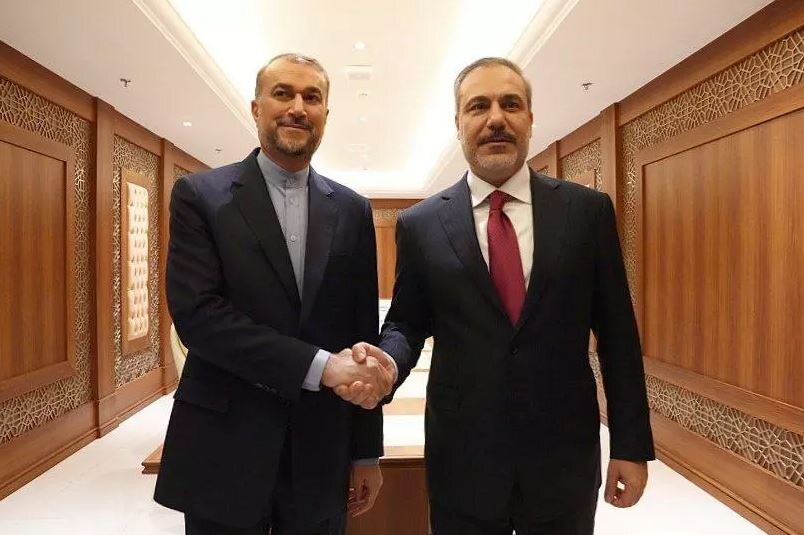Iranian, Turkish FMs advocate for enhanced relations

TEHRAN - Iranian Foreign Minister Hossein Amirabdollahian has met his Turkish counterpart Hakan Fidan on the sidelines of the extraordinary meeting of foreign ministers from member countries of the Organization of Islamic Cooperation in Jeddah, Saudi Arabia.
Amirabdollahian expressed contentment with the meeting and the ongoing consultations with Turkey. He underscored the recent successful visit of Iran's President to Ankara and the eighth Supreme Council meeting between the two nations, emphasizing the importance of translating the agreements reached during these events into tangible actions.
The Iranian Foreign Minister highlighted the pivotal role of the foreign ministries of both nations in executing the agreements made during the President's visit to Ankara. He stressed the necessity of activating joint committees in various domains to strengthen cooperation between Iran and Turkey. Amirabdollahian emphasized the importance of easing truck travel to boost commercial ties and noted Tehran's willingness to revive rail cooperation with Ankara.
Given the mutual stance on counterterrorism, Amirabdollahian emphasized the continuation and reinforcement of cooperation in this area. He expressed deep concern about the situation in Palestine and Gaza, articulating Iran's stance on the issue.
Fidan, expressing satisfaction with the meeting, acknowledged the significance of President Ebrahim Raisi's successful visit to Turkey and expressed satisfaction with its outcomes. He extended congratulations to Iran on successfully conducting parliamentary and Assembly of Experts elections.
Highlighting the enduring and warm relations between the two countries, Fidan emphasized Turkey's commitment to enhancing ties across various sectors with Iran as a primary objective. Fidan emphasized the importance of revitalizing rail transport cooperation and fostering people-to-people interactions, aligning with the shared commitment to bolster economic and commercial relations.
Both ministers discussed the situation in Palestine and explored avenues to address the conflict in Gaza perpetuated by the Zionist regime.
Amirabdollahian also engaged with his Tajik counterpart Sirojiddin Muhriddin during the Jeddah Summit, considering Iran and Tajikistan as akin nations. He emphasized advancing relations with Tajikistan as a key priority in Iran's foreign and neighboring policies, pledging full implementation of agreements signed during bilateral presidential meetings.
Enumerating cooperation opportunities, Amirabdollahian highlighted areas such as technical engineering services, knowledge-based companies, transit, energy, science, and education. He stressed the need to materialize existing agreements through collaborative efforts and supported initiatives to promote people-to-people interactions and ongoing political consultations.
Expressing gratitude for Tajikistan's support on Palestine, Amirabdollahian welcomed Dushanbe's engagement in the Jeddah Summit as a positive and hopeful message for the Palestinian people.
Muhriddin, for his part, emphasized the importance of mutual cooperation in regional and international spheres and collaborative efforts to address regional crises. He also highlighted the significance of political consultations between the two countries.
